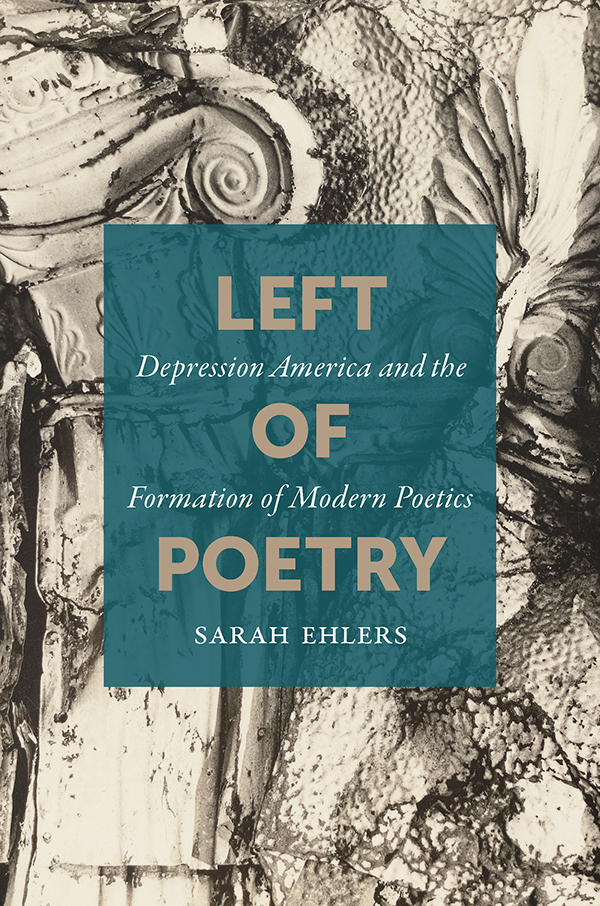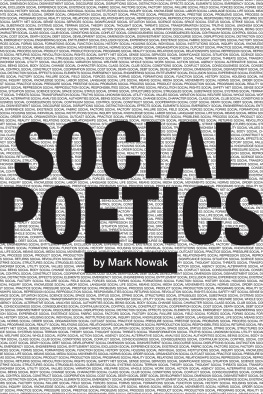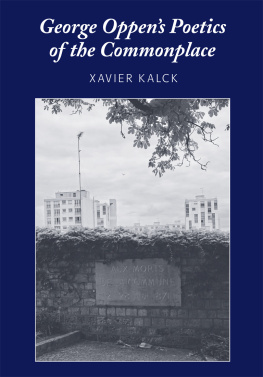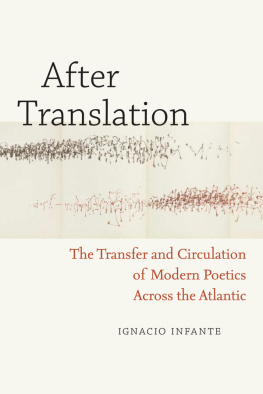Contents
Guide
Pagebreaks of the print version

Left of Poetry
SARAH EHLERS
Left of Poetry
Depression America and the Formation of Modern Poetics
The University of North Carolina Press Chapel Hill
This book was published with the assistance of the Authors Fund of the University of North Carolina Press.
2019 The University of North Carolina Press
All rights reserved
Set in Arno Pro by Westchester Publishing Services
Manufactured in the United States of America
The University of North Carolina Press has been a member of the Green Press Initiative since 2003.
Library of Congress Cataloging-in-Publication Data
Names: Ehlers, Sarah, author.
Title: Left of poetry : Depression America and the formation of modern poetics / Sarah Ehlers.
Description: Chapel Hill : University of North Carolina Press, [2019] | Includes bibliographical references and index.
Identifiers: LCCN 2018042307| ISBN 9781469651279 (cloth : alk. paper) | ISBN 9781469651286 (pbk : alk. paper) | ISBN 9781469651293 (ebook)
Subjects: LCSH : PoeticsHistory20th century. | American poetry20th centuryHistory. | American poetry20th centuryHistory and criticism.
Classification: LCC PS 324 . E 35 2019 | DDC 811/.5209dc23 LC record available at https://lccn.loc.gov/2018042307
Cover illustration: Detail of Stamped-Tin Relic (1929, gelatin silver print) by Walker Evans. Digital image courtesy of the Gettys Open Content Program.
A portion of chapter 3 was published as Whats Left of Lyric: Genevieve Taggard and the Redefinition of Song, in Lineages of the Literary Left: Essays in Honor of Alan M. Wald , ed. Howard Brick, Robbie Lieberman, and Paula Rabinowitz (Ann Arbor: University of Michigan Press, 2015), 2037.
A short excerpt from chapter 5 was published as Communism for Kids: Martha Millet, the New Pioneer, and the Popularity of the Old Left, on Mike Chasars Poetry and Popular Culture blog, posted 18 April 2013.
For Jason and for Jonah:
The universe is made of stories, not of atoms.
Muriel Rukeyser, The Speed of Darkness
It has now become plain that the economic crisis is to be accompanied by a literary one.
Edmund Wilson, The Literary Class War
Contents
Illustrations
Acknowledgments
My critical interest in the poetic culture of the Depression-era left grew from uncritical attachments. As a first-generation college student from a rural, working-class background, I have often felt out-of-place, if not unwelcome, in academia. During difficult years as a graduate student, the writers, artists, and activists of an earlier era provided a language for various forms of anger, and my love for their poetry a means to disidentify with institutions of art and criticism codified by people in positions of privilege. The study I eventually pursued would have been impossible without Alan Wald, a peerless thinker and generous mentor who sets the example for committed scholarship.
Yopie Prins and June Howard taught me to read rigorously and encouraged me to trust my instincts; their brilliant methodological insights mark every page. My teachers from the University of Michigan are sustaining influencesespecially Howard Brick, Joshua Miller, Gillian White, John Whittier-Ferguson, and Sara Blair, to whom I owe my abiding interest in visual culture. Paula Rabinowitzs scholarship was an inspiration before I met her in person, and she has been an encouraging force since my first years as a graduate student. Perhaps my greatest debt is to Victoria Harris. Because of her, my first lessons in poetry were also lessons in politics.
At the University of South Dakota, John Dudley and Emily Haddad fostered my early career and, along with my first-rate colleagues Sarah Townsend and Skip Willman, offered incisive and generous feedback on early drafts. I am energized continually by the dynamic intellectual and creative communities at the University of Houston. The people to thank for support, conversation, and advice are too numerous to name. Nonetheless, I would be remiss if I did not acknowledge my American Studies and Poetics colleagues Lauren Brozovich, Sally Connolly, Amanda Ellis, Elizabeth Gregory, and Michael Snediker for their comments on chapter drafts, as well as Wyman Herendeen and James Kastely for material support. I have also benefited from interactions with an incredible cohort of graduate students, especially Erika Jo Brown, Niki Herd, Alexandra Naumann, Henk Rossouw, and the inimitable Rhianna Brandt, who saved the day. One could not ask for a better colleague than Roberto Tejada, whose dazzling intellect improved these pages in the final rounds. For feedback as well as friendship, my thanks to Julie Tolliver and Cedric Tolliver. Cedric has been a true department comrade from day onemay our long hallway conversations about the literary left continue.
It has been a pleasure working with the University of North Carolina Press, an institution whose long-standing commitment to scholarship on literary radicalism is well alive. I would like to thank Mark Simpson-Vos for his early interest in the project, and I am especially grateful to Lucas Church for his support of the book and for ushering it to completion. The insightful commentary offered by the presss two anonymous readers pushed my thinking and made Left of Poetry a far better book.
A number of individuals generously shared information and granted permission to reproduce archival materials. I owe particular gratitude to Jerri Dell, Alex Garlin, Emily Garlin, Judith Benet Richardson, the late Perry Robinson, William Rukeyser, and Ronald Sauer as well as Craig Tenney and Alex Smithline at Harold Ober Associates. Selections from chapter three and chapter five appeared previously in slightly different form, and I thank the University of Michigan Press and Cambridge University Press for permission to reprint them here.
Librarians at the University of Michigan Labadie Collection, the University of Chicago Special Collections Research Center, the Yale University Beinecke Rare Book and Manuscript Library, the New York Public Library, the Newberry Library, the University of Pennsylvania Kislak Center, and the Library of Congress helped to locate and reproduce essential unpublished materials. John Durham welcomed me to Bolerium Books and provided a space to rifle through papers. Funding for research trips was generously provided by a fellowship from the University of Chicago Libraries as well as grants from the University of Michigan English Department, the University of South Dakota College of Arts and Sciences, and the University of Houston College of Liberal Arts and Social Sciences.
Conversations with colleagues in left literary studies and modernist poetry studies have enlivened my thinking. Thanks to Benjamin Balthaser, Mike Chasar, Cheryl Higashida, Walt Hunter, Robbie Lieberman, Julia Mickenberg, and Chris Vials as well as my Michigan comrades Konstantina Karageorgos and Nate Mills. For invaluable exchanges about modern poetics, a special shout out to Caroline Gelmi, Melissa Girard, and Erin Kappeler. A now dispersed cohort of beloved friends from Ann ArborKatie Brokaw, Nan Da, Asynith Palmer, and Sheera Talpazsustained me along the way. Sara Lampert was a lifesaver during the coldest winter. Rachel Feder and Rebecca Porte find the right words and put them in the right order; they have always made everything dance.
My parents, Byron and Janine Ehlers, labored to support my education, and I am forever grateful for the love that they and my brother, Gavin, have given over the years. The memory of Orlu Kleber has stuck with me at every turn. James and Deborah Berger, indeed the entire Berger crew, were always ready with encouraging words. David Michael Jones should only find his name in the paragraph reserved for thanking ones family.









